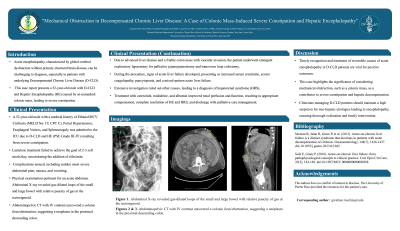Monday Poster Session
Category: Liver
P3038 - Mechanical Obstruction in Decompensated Chronic Liver Disease: A Case of Colonic Mass-Induced Severe Constipation and Hepatic Encephalopathy
Monday, October 28, 2024
10:30 AM - 4:00 PM ET
Location: Exhibit Hall E

Has Audio

Gretchen Rios, MD
University of Puerto Rico, Medical Sciences Campus
San Juan, PR
Presenting Author(s)
Gretchen Rios Grant, MD1, Reinaldo Hernandez, MD1, Lenis Rovira, MD1, Gerardo Cintron Velez, MD1, Keishla Jimenez Ortega, MD1, Viviana Blanco, MD2, Elsie Cruz, MD1
1University of Puerto Rico, Medical Sciences Campus, San Juan, Puerto Rico; 2University of Puerto Rico Medical Sciences Campus, Coto Laurel, Puerto Rico
Introduction: Acute encephalopathy, characterized by global cerebral dysfunction without primary structural brain disease, can be challenging to diagnose, especially in patients with underlying Decompensated Chronic Liver Disease (D-CLD). This case report presents a 52-year-old male with D-CLD and Hepatic Encephalopathy (HE) caused by an unmasked colonic mass, leading to severe constipation.
Case Description/Methods: A 52-year-old male with a medical history of Ethanol/HCV Cirrhosis (MELD Na: 19, CPC C), Portal Hypertension, Esophageal Varices, and Splenomegaly was admitted to the ICU due to D-CLD and HE (PSE Grade III-IV) resulting from severe constipation. Lactulose treatment failed to achieve the goal of 2-3 soft stools/day, necessitating the addition of rifaximin. Complications ensued, including sudden onset severe abdominal pain, nausea, and vomiting. Physical examination was notable for an acute abdomen. Abdominal X-ray revealed gas-dilated loops of the small and large bowel with relative paucity of gas at the rectosigmoid. Abdominopelvic CT with IV contrast uncovered a colonic ileus/obstruction, suggesting a neoplasm in the proximal descending colon. Due to advanced liver disease and a friable colon mass with vascular invasion, the patient underwent emergent exploratory laparotomy for palliative jejunojejunostomy and transverse loop colostomy. During the procedure, signs of acute liver failure developed, presenting as increased serum creatinine, severe coagulopathy, pancytopenia, and a mixed-pattern acute liver failure. Extensive investigation ruled out other causes, leading to a diagnosis of hepatorenal syndrome (HRS). Treatment with octreotide, midodrine, and albumin improved renal perfusion and function, resulting in appropriate compensation, complete resolution of HE and HRS, and discharge with palliative care management.
Discussion: Timely recognition and treatment of reversible causes of acute encephalopathy in D-CLD patients are vital for positive outcomes. This case highlights the significance of considering mechanical obstruction, such as a colonic mass, as a contributor to severe constipation and hepatic decompensation. Clinicians managing D-CLD patients should maintain a high suspicion for non-hepatic etiologies leading to encephalopathy, ensuring thorough evaluation and timely intervention.
Disclosures:
Gretchen Rios Grant, MD1, Reinaldo Hernandez, MD1, Lenis Rovira, MD1, Gerardo Cintron Velez, MD1, Keishla Jimenez Ortega, MD1, Viviana Blanco, MD2, Elsie Cruz, MD1. P3038 - Mechanical Obstruction in Decompensated Chronic Liver Disease: A Case of Colonic Mass-Induced Severe Constipation and Hepatic Encephalopathy, ACG 2024 Annual Scientific Meeting Abstracts. Philadelphia, PA: American College of Gastroenterology.
1University of Puerto Rico, Medical Sciences Campus, San Juan, Puerto Rico; 2University of Puerto Rico Medical Sciences Campus, Coto Laurel, Puerto Rico
Introduction: Acute encephalopathy, characterized by global cerebral dysfunction without primary structural brain disease, can be challenging to diagnose, especially in patients with underlying Decompensated Chronic Liver Disease (D-CLD). This case report presents a 52-year-old male with D-CLD and Hepatic Encephalopathy (HE) caused by an unmasked colonic mass, leading to severe constipation.
Case Description/Methods: A 52-year-old male with a medical history of Ethanol/HCV Cirrhosis (MELD Na: 19, CPC C), Portal Hypertension, Esophageal Varices, and Splenomegaly was admitted to the ICU due to D-CLD and HE (PSE Grade III-IV) resulting from severe constipation. Lactulose treatment failed to achieve the goal of 2-3 soft stools/day, necessitating the addition of rifaximin. Complications ensued, including sudden onset severe abdominal pain, nausea, and vomiting. Physical examination was notable for an acute abdomen. Abdominal X-ray revealed gas-dilated loops of the small and large bowel with relative paucity of gas at the rectosigmoid. Abdominopelvic CT with IV contrast uncovered a colonic ileus/obstruction, suggesting a neoplasm in the proximal descending colon. Due to advanced liver disease and a friable colon mass with vascular invasion, the patient underwent emergent exploratory laparotomy for palliative jejunojejunostomy and transverse loop colostomy. During the procedure, signs of acute liver failure developed, presenting as increased serum creatinine, severe coagulopathy, pancytopenia, and a mixed-pattern acute liver failure. Extensive investigation ruled out other causes, leading to a diagnosis of hepatorenal syndrome (HRS). Treatment with octreotide, midodrine, and albumin improved renal perfusion and function, resulting in appropriate compensation, complete resolution of HE and HRS, and discharge with palliative care management.
Discussion: Timely recognition and treatment of reversible causes of acute encephalopathy in D-CLD patients are vital for positive outcomes. This case highlights the significance of considering mechanical obstruction, such as a colonic mass, as a contributor to severe constipation and hepatic decompensation. Clinicians managing D-CLD patients should maintain a high suspicion for non-hepatic etiologies leading to encephalopathy, ensuring thorough evaluation and timely intervention.
Disclosures:
Gretchen Rios Grant indicated no relevant financial relationships.
Reinaldo Hernandez indicated no relevant financial relationships.
Lenis Rovira indicated no relevant financial relationships.
Gerardo Cintron Velez indicated no relevant financial relationships.
Keishla Jimenez Ortega indicated no relevant financial relationships.
Viviana Blanco indicated no relevant financial relationships.
Elsie Cruz indicated no relevant financial relationships.
Gretchen Rios Grant, MD1, Reinaldo Hernandez, MD1, Lenis Rovira, MD1, Gerardo Cintron Velez, MD1, Keishla Jimenez Ortega, MD1, Viviana Blanco, MD2, Elsie Cruz, MD1. P3038 - Mechanical Obstruction in Decompensated Chronic Liver Disease: A Case of Colonic Mass-Induced Severe Constipation and Hepatic Encephalopathy, ACG 2024 Annual Scientific Meeting Abstracts. Philadelphia, PA: American College of Gastroenterology.
